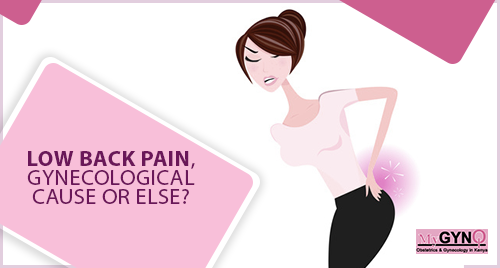- Clinic:
- 0733 945 717
- 0739 434 212

I have fibroids, and am pregnant
March 13, 2023
Understanding urinary tract infections
March 17, 2023Low back pain, Gynecological cause or else?

Low back pain is a common ailment. The pain will often only affect the lower back, but it may also be felt down the front,side, or back of your leg.
Most women will experience low back pain at some point in their lifetime.
But should women experiencing low back pains visit Gynecologists or another specialist in the first instance?
Your back is a complex structure made up of bones, muscles, nerves and joints. This can often make it difficult to pinpoint the exact cause of the pain. Most cases of low back pain are not caused by serious damage or disease but by sprains, minor strains, minor injuries or a pinched or irritated nerve. Low back pain can be triggered by everyday activities at home or at work, or it can develop gradually over time as a result of prolonged sitting or standing or lifting badly. Sometimes low back pain develops suddenly for no apparent reason.
Contrary to common perception, women experiencing low back pain do not usually have any significant Gynecological disease. Common Gynecological conditions like fibroids or small ovarian cysts are unlikely to be the cause of low back pain. Before attributing any Gynecological condition as the cause of your back pain, other more common conditions must be excluded first. Pregnancy though may be associated with low back pain, usually due to the extra strain of carrying the pregnancy for several months.
You are at risk of developing low back pain if overweight, are a smoker, you are on certain medications or are stressed and depressed. Overuse of the back muscles with strenuous exercises, heavy lifting and bending, and conditions like arthritis may also put you at risk of low back pain.
Most cases of low back pain can be treated with over-the-counter painkillers. However, you should seek medical help if simple remedies are ineffective. Your family doctor may be the most appropriate to consult in the first instance. A basic evaluation may easily pinpoint the cause of your pain. If a more serious cause is suspected, imaging of the lower back and other tests may be suggested, often be followed by a referral to an Orthopaedic surgeon. Your Gynecologist may not need to do much. In most instances, what may be seen in the pelvis on imaging may be coincidental rather than the cause of your pain.
Your treatment should involve a team of specialists and may be a combination pain killers, physiotherapy, relaxation techniques, lifestyle changes or even surgery in certain cases. But you can also help yourself with preventive measures. Maintain a healthy weight, wear flat and cushioned shoes, stay active, avoid sudden strenuous movements, and watch your posture at work and play. Finally, invest in a good firm mattress that maintains the natural posture of your spine.
Take a fertility test today
